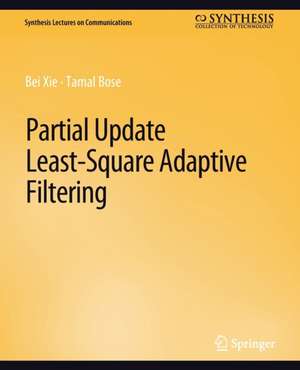Partial Update Least-Square Adaptive Filtering: Synthesis Lectures on Communications
Autor Bei Xie, Tamal Boseen Limba Engleză Paperback – 19 mai 2014
Din seria Synthesis Lectures on Communications
-
 Preț: 373.23 lei
Preț: 373.23 lei -
 Preț: 421.93 lei
Preț: 421.93 lei - 15%
 Preț: 404.10 lei
Preț: 404.10 lei -
 Preț: 266.92 lei
Preț: 266.92 lei -
 Preț: 192.41 lei
Preț: 192.41 lei -
 Preț: 206.29 lei
Preț: 206.29 lei -
 Preț: 206.29 lei
Preț: 206.29 lei -
 Preț: 263.06 lei
Preț: 263.06 lei -
 Preț: 262.47 lei
Preț: 262.47 lei -
 Preț: 262.09 lei
Preț: 262.09 lei -
 Preț: 319.59 lei
Preț: 319.59 lei -
 Preț: 260.77 lei
Preț: 260.77 lei -
 Preț: 204.56 lei
Preț: 204.56 lei -
 Preț: 205.15 lei
Preț: 205.15 lei -
 Preț: 361.58 lei
Preț: 361.58 lei
Preț: 261.53 lei
Nou
Puncte Express: 392
Preț estimativ în valută:
50.04€ • 52.39$ • 41.41£
50.04€ • 52.39$ • 41.41£
Carte tipărită la comandă
Livrare economică 07-21 aprilie
Preluare comenzi: 021 569.72.76
Specificații
ISBN-13: 9783031005534
ISBN-10: 3031005538
Ilustrații: XI, 105 p.
Dimensiuni: 191 x 235 mm
Greutate: 0.22 kg
Editura: Springer International Publishing
Colecția Springer
Seria Synthesis Lectures on Communications
Locul publicării:Cham, Switzerland
ISBN-10: 3031005538
Ilustrații: XI, 105 p.
Dimensiuni: 191 x 235 mm
Greutate: 0.22 kg
Editura: Springer International Publishing
Colecția Springer
Seria Synthesis Lectures on Communications
Locul publicării:Cham, Switzerland
Cuprins
Introduction.- Background.- Partial Update CMA-based Algorithms for Adaptive Filtering.- Partial-Update CG Algorithms for Adaptive Filtering.- Partial-Update EDS Algorithms for Adaptive Filtering.- Special Applications of Partial-Update Adaptive Filters.- Bibliography.- Authors' Biographies .
Notă biografică
Bei Xie received a PhD in electrical engineering from Virginia Polytechnia University in 2012. Her interests include signal processing and communications.Dr. Tamal Bose serves as Professor and Department Head of Electrical and Computer Engineering at the University of Arizona. He is also the Director of a multi-university NSF Center called the Broadband Wireless Access & Applications Center (BWAC). Dr. Bose's research interests include signal classification for cognitive radios, channel equalization, adaptive filtering algorithms, and nonlinear effects in digital filters. He is author of the text Digital Signal and Image Processing, John Wiley, 2004, and coauthor of Basic Simulation Models of Phase Tracking Devices Using MATLAB, Morgan & Claypool Publishers, 2010.
